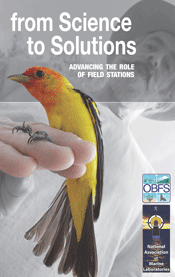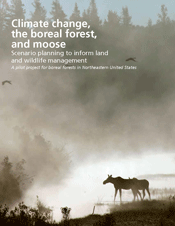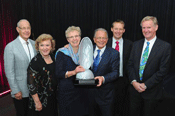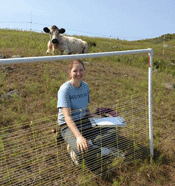From Science to Solutions: Advancing the Role of Field Stations
 In a time of declining resources, field stations (including marine labs and nature reserves) are struggling to maintain and enhance their important contributions to scientific discovery, innovation, education, and public outreach. At a recent meeting of the National Association of Marine Laboratories (NAML) and the Organization of Biological Field Stations (OBFS) in Woods Hole, MA, Bill Dennison was asked by Jeff Brown, Director of UC Berkeley's Central Sierra Field Research Stations, to help create an OBFS/NAML publication, targeting legislators, government funding agencies, and educational institutions. The goal was to feature the scientific and social value of field stations, the need for their support, and their future plans for sustainability. Working from a 2014 National Academy of Sciences (NAS) report on future of field stations, Jane Hawkey worked closely with Jeff and his team under a tight deadline to synthesize the NAS report and create this colorful brochure.
In a time of declining resources, field stations (including marine labs and nature reserves) are struggling to maintain and enhance their important contributions to scientific discovery, innovation, education, and public outreach. At a recent meeting of the National Association of Marine Laboratories (NAML) and the Organization of Biological Field Stations (OBFS) in Woods Hole, MA, Bill Dennison was asked by Jeff Brown, Director of UC Berkeley's Central Sierra Field Research Stations, to help create an OBFS/NAML publication, targeting legislators, government funding agencies, and educational institutions. The goal was to feature the scientific and social value of field stations, the need for their support, and their future plans for sustainability. Working from a 2014 National Academy of Sciences (NAS) report on future of field stations, Jane Hawkey worked closely with Jeff and his team under a tight deadline to synthesize the NAS report and create this colorful brochure.
Scenario planning with USGS
 IAN has again joined forces with Shawn Carter in his new role as Senior Scientist at the National Climate Change & Wildlife Science Center. The NCCWSC was created by Congress in 2008 to provide scientific information to assist managers of the Nation's fish and wildlife, and their habitats in responding to climate change. The NCCWSC is a part of the U.S. Geological Survey's Climate and Land Use Change Mission Area (CLU) and acts as the managing entity for the eight Department of the Interior (DOI) Climate Science Centers (CSCs) located throughout the country. IAN will provide data compilation and synthesis services for climate change research activities operating through the NCCWSC's Climate Science Center. This has begun by assisting in a pilot project for boreal forests in Northeastern United States led by the Wildlife Conservation Society in collaboration with the Northeast Climate Science Center and North Atlantic Landscape Conservation Cooperative. The project utilizes scenario planning to inform land and wildlife management on issues related to climate change, the boreal forest, and moose.
IAN has again joined forces with Shawn Carter in his new role as Senior Scientist at the National Climate Change & Wildlife Science Center. The NCCWSC was created by Congress in 2008 to provide scientific information to assist managers of the Nation's fish and wildlife, and their habitats in responding to climate change. The NCCWSC is a part of the U.S. Geological Survey's Climate and Land Use Change Mission Area (CLU) and acts as the managing entity for the eight Department of the Interior (DOI) Climate Science Centers (CSCs) located throughout the country. IAN will provide data compilation and synthesis services for climate change research activities operating through the NCCWSC's Climate Science Center. This has begun by assisting in a pilot project for boreal forests in Northeastern United States led by the Wildlife Conservation Society in collaboration with the Northeast Climate Science Center and North Atlantic Landscape Conservation Cooperative. The project utilizes scenario planning to inform land and wildlife management on issues related to climate change, the boreal forest, and moose.
International and regional RiverPrizes awarded
 The International Commission for the Protection of the Rhine River was the 2014 recipient of the Theiss International RiverPrize, awarded in Canberra, Australia in September as part of the 16th annual International Riversymposium. The 2014 Australian RiverPrize was awarded to the Lake Eyre Basin at the same event. The River Mur was the recipient of the European RiverPrize, awarded in Vienna in October, and will automatically be a finalist for the 2015 Theiss International RiverPrize. Applications for the inaugural North American RiverPrize are now open. All of these river prizes celebrate best practice in river management and provide inspirational models of achieving demonstrable progress in spite of significant obstacles. A book that chronicles the achievements of RiverPrize recipients (River Journeys 3) was recently published.
The International Commission for the Protection of the Rhine River was the 2014 recipient of the Theiss International RiverPrize, awarded in Canberra, Australia in September as part of the 16th annual International Riversymposium. The 2014 Australian RiverPrize was awarded to the Lake Eyre Basin at the same event. The River Mur was the recipient of the European RiverPrize, awarded in Vienna in October, and will automatically be a finalist for the 2015 Theiss International RiverPrize. Applications for the inaugural North American RiverPrize are now open. All of these river prizes celebrate best practice in river management and provide inspirational models of achieving demonstrable progress in spite of significant obstacles. A book that chronicles the achievements of RiverPrize recipients (River Journeys 3) was recently published.
IAN welcomes Suzi Spitzer
 Suzi Spitzer has joined IAN, working as a Science Communication Intern in the Annapolis Office. Suzi graduated from the University of Notre Dame in 2013, where she studied Biology and Anthropology. She spent the last year working as a Research Assistant at the Marine Biological Laboratory Ecosystems Center in Woods Hole, MA. Since starting at IAN in August, Suzi has been involved in a wide variety of projects collecting and analyzing data, conducting literature reviews, creating conceptual diagrams, and assembling posters and inserts. Her current projects include the Long Island Sound Report Card, the Chesapeake Bay 2014 Summer Review and the Report Card Review. Suzi is interested in pursuing a career in ecological research and is eager to learn more techniques for how to effectively convey scientific information to different audiences outside of academia. In her free time, Suzi enjoys hiking, travelling, photography, and learning how to tat.
Suzi Spitzer has joined IAN, working as a Science Communication Intern in the Annapolis Office. Suzi graduated from the University of Notre Dame in 2013, where she studied Biology and Anthropology. She spent the last year working as a Research Assistant at the Marine Biological Laboratory Ecosystems Center in Woods Hole, MA. Since starting at IAN in August, Suzi has been involved in a wide variety of projects collecting and analyzing data, conducting literature reviews, creating conceptual diagrams, and assembling posters and inserts. Her current projects include the Long Island Sound Report Card, the Chesapeake Bay 2014 Summer Review and the Report Card Review. Suzi is interested in pursuing a career in ecological research and is eager to learn more techniques for how to effectively convey scientific information to different audiences outside of academia. In her free time, Suzi enjoys hiking, travelling, photography, and learning how to tat.
On the Horizon...
- Science for Environmental Management Course Part of the MEES Spring Semester 2015 program, MEES 689Y: Special Topics in Marine Estuarine Environmental Science is being taught by Drs. Don Boesch and Bill Dennison. Using theory, case studies, practitioner perspectives,and current environmental issues as topics, this 3 credit course addresses the role of science in environmental management. Through the course, students will develop synthesis and science communication skills through tutorials, readings, and assignments. In addition, students will be trained to produce conceptual diagrams, media releases, and briefing papers.
- Staff will be presenting a draft of the Willamette River Report Card at the Within Our Reach Conference in Portland, OR December 11-12.

